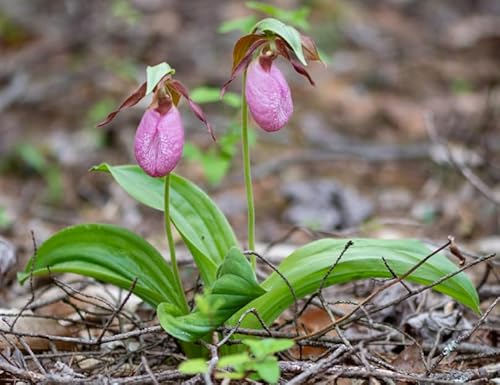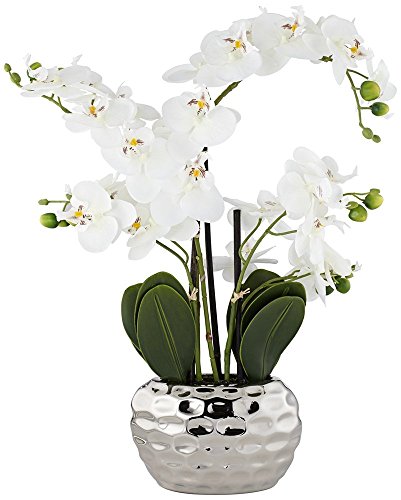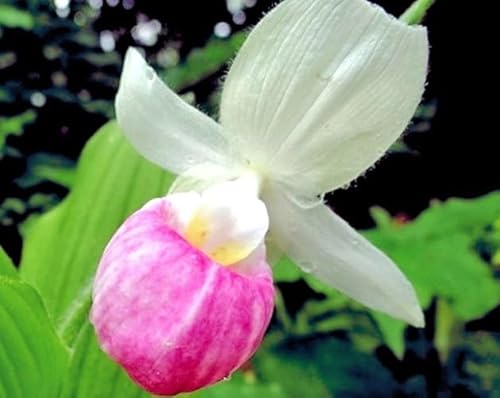The other problem is that for most of the selection or breeding lines, they DO NOT exist without viruses, CyMV or ORSV. It is as well up to the consumer to stay away from those, and to the retailer to know it, and not stock such items, or only for supermarket pot plant.
Taiwanese ( well, we say "taiwanese", but in fact it is Chinese, nearly all the Taiwanese got their plants processed from cloning to NBS in Mainland China nowadays) have the cheapest plants worldwide for the phals. No one can compete with them. They have some breeding lines that could be found very desirable, such as the harlequins.
Many phalaenopsis actually cannot breed easily, the seeds have to be harvested when the seed caps is green. This trend started with Phal. Golden Sands 'Canary', whose most progeny can be safely assumed to be virused, and more recently with ALL the harlequins. Furthermore, there is a lot of competition in Taiwan, and they have to process everything quickly, so green caps is their way to go.
Why they breed so many plants and get them awarded/cloned ? Not for the hobby market. They generate some income by releasing stem props to foolish people thinking they buy the latest "trend" in taiwanese phals and make a wonderful investment ( the first 10 plants of ever spring king 'Lee' went to hobbyists for 1000$+ each plant ! 6 months later, the first batch of meristem was released, at 10$ a plant at first, around 5000 plants !).
But their main income is the pot-plant. The breeders work to make new hybrids with showy flowers that will be used by the large scale pot-plant nurseries. Nothing more, nothing less. Virus in this industry is negligible, at least they think, because the end product is expected to be short-lived, they grow it, bloom it once, and sell it, byebye.
Now my thinkings:
- Pëople know for a long time that there is definitely a virus problem in many taiwanese nurseries, for phals and catts, but sometimes for paphs as well. If they are so addicted to buy such plants ( in the case of experienced growers I mean), that's their choice as well.
- If people choose to have phals that come from pot-plant market ( all the harlequins are bred and crossed by the zillions, in Ha Noi we get phals from a amazingly large nursery near Shanghai, and I have seen many, many of the 'latest breeding' in harlequins sold for 3$ a plant in bloom !) and include them in their collection, that's their choice too. I think that anyway, there should be a listing of the people who test their plants, so the cultivars that are virused are known. If 2 plants of the same cultivar are virused, it simply means that the motherplant is virused as well, hence all the plants from that cultivar, worldwide. That would be helpful. Same should be done for the catts. At least, people will restrain from buying those cultivars, and buy others ( that they will have to get tested anyway, who knows...).
- Sometimes something can be gorgeous and completely corrupt. It applies to humans as well. I think that the harlequins are beautiful for some of them, some of the non-harlequins are wonderful too from Taiwan ( the catts, sorry, but I prefer by far the US and Japanese breeding lines...), but we must force to forget about them, or accept to have a hell of a lot of problems with diseases ( viruses are one, but fusarium is another one hidden in many of those phals, due to the sphagnum they use.).
About making a guarantee that the plants are virus free, I think, at least some of the plants should be free of 5 viruses, CyMV, ORSV, Tomato Ringspot Virus, Orchid Fleck Virus, and BYMV. The "good practice" would be that each plant cloned is guaranteed to be free from those 5 viruses, and that they are not processed if they have any of thoses...
The non-virused "guaranteed" plants should be mentioned explicitely in the pricelists. Offering only non-virused plants would incur some more US$/plant, if every single plant is to be tested, and anyway, unfortunately many people do not care...
Regarding destroying a collection, CyMV and ORSV are "mild" compared to Orchid Fleck Virus. One odd fact, one famous nursery kept all their breeding plants in the same area, and the water below the plants could test positive for viruses. They were recirculating that water, not caring too much, because anyway those virused plants were used for dry seed breeding...
However, a plant that had ORSV nearly never got CyMV, and the opposite is true. So it appears that those 2 viruses are more difficult to transmit than OFV as an example (OFV has been known to infect plants by contact, and by dry seeds !).
One should not be completely paranoid about viruses, but get rid of any plant that is known to have virus, or any suspect plant ( plant that have some problems, such as chlorosis or otherwise...). Many viruses are more dangerous than ORSV or CyMV, but they cannot be detected easily...










































